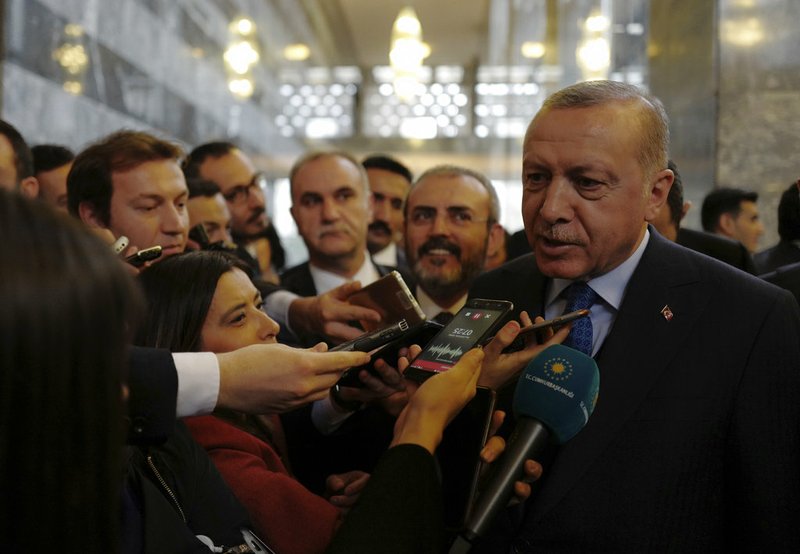ISTANBUL -- Turkey said Tuesday that it is working with the United States to coordinate the withdrawal of American forces but remains "determined" to clear U.S.-allied Kurdish fighters from northeastern Syria.
Foreign Minister Mevlut Cavusoglu told reporters in comments carried by Turkey's private Dogan News Agency that "if Turkey says it will enter, it will."
His comments came after reports that Turkey-backed Syrian rebels are preparing for a military operation in and near the northern town of Manbij, the last major Syrian town west of the Euphrates River controlled by the Kurds. Turkey is eager to see all Kurdish forces withdraw east of the river so they can't attempt to access the Mediterranean Sea.
Cavusoglu said Tuesday that Turkey and the U.S. agreed to make sure that the Kurdish fighters are withdrawn from Manbij before the U.S. withdraws. Turkey hopes to then take the U.S. role in Syria.
For weeks, Turkey has been threatening to launch a new offensive against the Kurds, who partnered with the U.S. to drive the Islamic State militant group out of much of northern and eastern Syria. Turkish officials view the Kurdish forces as terrorists because of their links to an insurgent group inside Turkey.
President Donald Trump announced the planned withdrawal of all of its 2,000 U.S. forces from Syria after a phone call with Turkish President Recep Tayyip Erdogan on Dec. 14.
Cavusoglu also said Ankara and Washington have agreed to complete a road map on Manbij until the U.S. withdraws. Under the June deal, Kurdish forces would leave Manbij, in the western Euphrates valley, but delays have infuriated Turkey.
Maj. Youssef Hammoud, of the Turkey-backed Syrian rebels known as the National Army, said the military operation against Kurdish-led forces in northern Syria is "near but has not started yet."
The Britain-based Syrian Observatory for Human Rights, a war monitor, said Tuesday that Turkey has ordered rebels it backs to begin a military operation in Manbij "in the coming hours."
"It is crucial that the U.S. doesn't appear as not having kept its promises," Cavusoglu said.
He argued that Turkey has the "strength to neutralize" the Islamic State on its own and criticized France, which has promised to protect the main Kurdish militia, despite the U.S. decision.
Cavusoglu warned France that neither Syria nor the Kurds would benefit if France chooses to stay in Syria.
"Turkey has the power to eradicate Daesh in Syria on its own," Cavusoglu said, using an Arabic acronym for the Islamic State.
Erdogan, speaking to reporters in Ankara, said Turkey was taking into account Trump's announcement on Syria rather than French President Emmanuel Macron's decision. The future of the international coalition against the Islamic State, which includes Turkey, the U.S. and France, remains unclear.
Observers say relations between Turkey and the U.S. have improved dramatically since the Dec. 14 phone call between Erdogan and Trump. The State Department notified Congress last week that Turkey has proposed to buy the Patriot air and missile defense system from the U.S.
Turkey had been moving closer to Russia and had alarmed its NATO allies with a plan to buy that nation's S-400 missiles. Experts hope the Patriot proposal signals a breakthrough with Erdogan's government.
Turkey's proposal to buy missiles from the U.S. is subject to discussions on joint production, price, technology transfer and delivery time, presidential spokesman Ibrahim Kalin said this week.
"If the U.S. administration can come up with a proposal that could satisfy Turkey and meet the conditions, then Turkey would look at it favorably," he said.
In addition, the White House said late Monday night that Erdogan has invited Trump to visit Turkey next year. Hogan Gidley, a White House spokesman, said in a statement that Trump has not accepted the offer but "is open to a potential meeting in the future."
Turkey continues to detain a NASA scientist and Turkish employees of the State Department after freeing a detained American pastor earlier this year.
Erdogan has been frustrated by the January conviction in a U.S. court of a Turkish banker on charges of helping Iran evade sanctions on billions of dollars of oil revenue. However, Cavusoglu said the banker, Hakan Atilla, may be freed to return home.
Erdogan's government has demanded that the Turkish cleric Fethullah Gulen, a former Erdogan ally who has been living in the U.S., be extradited.
The Turkish president also announced that a delegation was heading to Moscow and that he would meet with Russian President Vladimir Putin. Turkey has been negotiating on behalf of the Syrian opposition with Russia and Iran, which support the Syrian government, as part of efforts to end the nearly eight-year civil war that has forced millions of Syrians to flee.
The U.S. withdrawal from Syria will leave control of the oil-rich eastern third of Syria up for grabs. Trump has declared that the U.S. had largely defeated Islamic State militants, saying that fight was "my only reason for being there."
Russia launched its military operation in Syria in 2015 to back its longtime ally President Bashar Assad.
The planned U.S. withdrawal prompted questions about whether the U.S. would also terminate a hotline that Russia and the U.S. have used to prevent potential clashes in Syria. Russian Deputy Foreign Minister Sergei Ryakov said Tuesday in an interview with the RIA Novosti news agency that it would be a "big mistake" to dismantle the hotline, and that he sees no indications the Americans would do that.
Information for this article was contributed by Zeynep Bilginsoy, Nataliya Vasilyeva, Bassem Mroue and Sarah El Deeb of The Associated Press; and by Alyza Sebenius and Selcan Hacaoglu of Bloomberg News.
A Section on 12/26/2018
